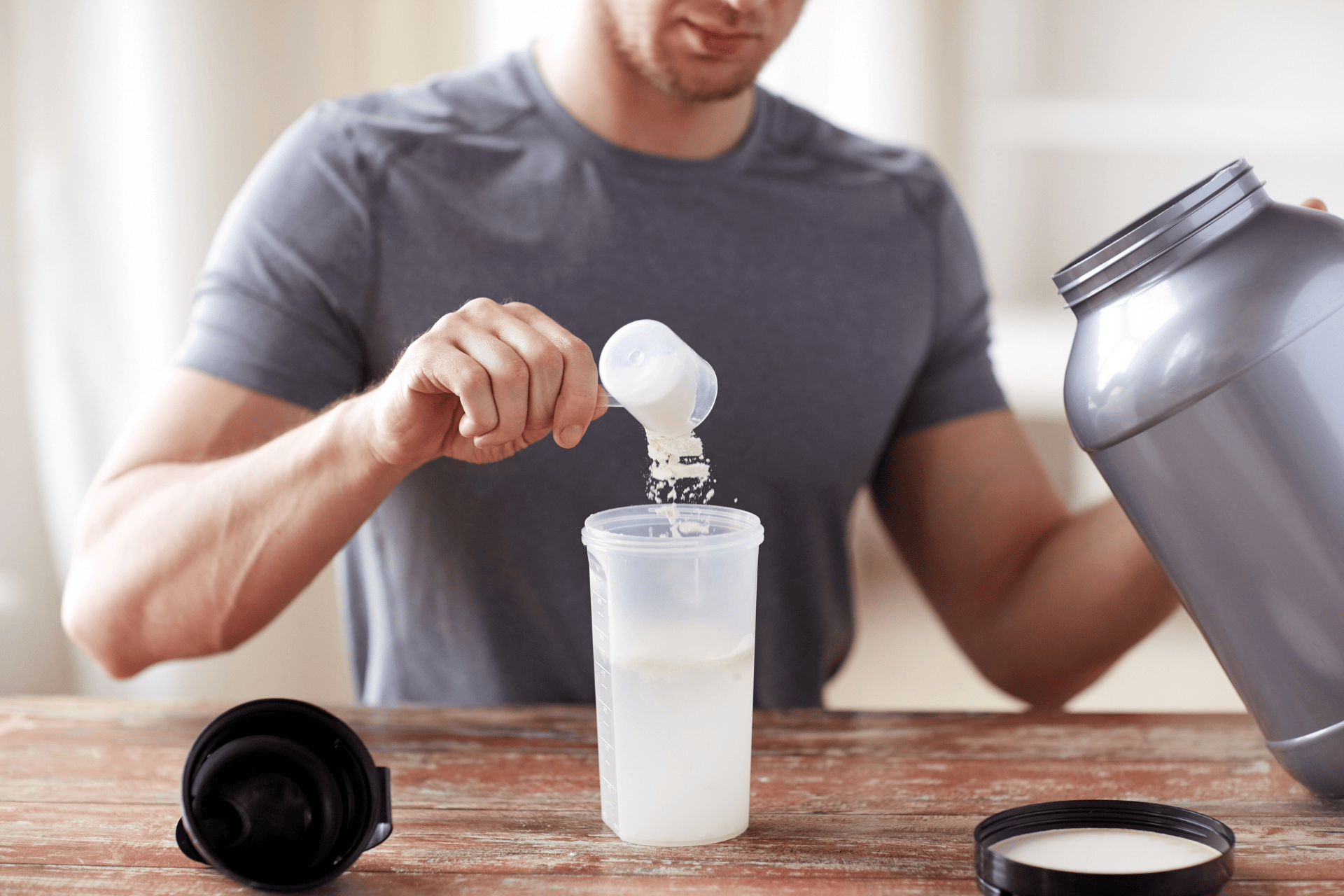Does Creatine Actually Boost Testosterone?
Many people take creatine to improve their workout performance and build muscle. But there is a common question: Does creatine also boost testosterone levels? Testosterone is [...]
Read More
Medically reviewed by Alan Lucks | MD, Alan Lucks MDPC Private Practice - New York on November 13th, 2025.
Most controlled studies show no significant change in total testosterone levels after 3-8 weeks of supplementation at standard doses of 3-5 grams daily.
The compound works by rapidly regenerating ATP (cellular energy currency) during high-intensity exercise lasting 10-15 seconds, improving power output by 5-15%.
Loading with 20 grams daily for 5-7 days saturates muscle stores faster, but taking 3-5 grams consistently achieves the same saturation within 3-4 weeks.
Strength gains typically increase 5-10% within the first month, while muscle mass improvements require 6-12 weeks of consistent use combined with resistance training.
Persistent fatigue, unexplained muscle loss, or reduced libido lasting more than 2-3 weeks may indicate low testosterone requiring hormone testing, not supplementation.
Many people take creatine to improve their workout performance and build muscle. But there is a common question: Does creatine also boost testosterone levels? Testosterone is important for muscle growth, energy, and overall health, so it’s natural to wonder if creatine can help with that too. This article will explore what creatine is, how it works, and whether it really affects testosterone.
Creatine is a natural substance found in muscles. It helps produce energy during short bursts of intense activity, like lifting weights or sprinting. People often take creatine supplements to increase their muscle strength and size.
When you take creatine, it increases the amount stored in your muscles. This extra creatine helps your muscles produce energy faster, letting you train harder and longer. That’s why creatine is one of the most popular and well-researched supplements in fitness.
 Creatine’s Main Benefits
Creatine’s Main BenefitsImproves strength and power during workouts
Helps muscles recover faster
Supports muscle growth over time
May improve brain function in some cases
These benefits are backed by many scientific studies, making creatine a trusted choice for athletes and fitness enthusiasts. Additionally, creatine is not only beneficial for those engaged in high-intensity training but also shows promise for endurance athletes. Some research suggests that creatine can help improve performance in sports that require repeated bouts of high-intensity efforts, such as soccer or basketball, by enhancing recovery between sprints.
Moreover, creatine's potential cognitive benefits are gaining attention. Studies have indicated that creatine supplementation may enhance cognitive performance, particularly in tasks that require short-term memory and quick thinking. This has led to interest in its use among students and professionals who face mentally demanding situations. As a result, creatine is being explored not just as a supplement for physical performance but also as a potential aid for mental agility and focus, making it a versatile addition to a well-rounded supplement regimen.
Testosterone is a hormone that plays a key role in male health. It helps build muscle, maintain bone density, and support mood and energy levels. Women also have testosterone, but in smaller amounts. This hormone is crucial not only for physical health but also for mental well-being, influencing aspects such as motivation and cognitive function. In men, testosterone levels peak in early adulthood and gradually decline with age, which can lead to various health issues if not addressed.
Low testosterone can cause fatigue, reduced muscle mass, and lower libido. Because of this, many people look for ways to naturally boost their testosterone levels. Symptoms of low testosterone can also include mood swings, irritability, and difficulty concentrating, which can significantly impact quality of life. Understanding the signs and symptoms is essential for individuals who may be experiencing these changes, as they can often be mistaken for other health issues.
Regular exercise, especially strength training
Getting enough sleep and managing stress
Eating a balanced diet with enough protein and healthy fats
Avoiding excessive alcohol and smoking
Supplements and lifestyle changes can help, but it’s important to be cautious and informed. For instance, certain vitamins and minerals, such as vitamin D and zinc, have been linked to testosterone production. Incorporating foods rich in these nutrients, like fatty fish, nuts, and leafy greens, can provide a natural boost. Additionally, engaging in activities that promote relaxation, such as yoga or meditation, can help mitigate stress, which is known to negatively affect hormone levels. It’s also worth noting that maintaining a healthy weight can play a significant role in testosterone regulation, as obesity is often associated with lower testosterone levels.
There is some confusion about whether creatine directly increases testosterone. Let’s look at what research says.
Most research finds that creatine does not significantly raise testosterone levels on its own. For example, a review of multiple studies showed no clear increase in testosterone after taking creatine supplements.
Some studies have reported small, transient increases in testosterone during intense training combined with creatine, but these changes are usually minor and short-lived. Creatine’s main effects seem to come from improving energy and performance, not hormone changes.
While creatine may not directly boost testosterone, it can support activities that do. For example:
By improving workout performance, creatine helps you lift heavier weights or train longer.
Stronger workouts can naturally temporarily increase testosterone levels.
Better muscle recovery and growth can support overall hormone health.
So, creatine might help create the right conditions for testosterone to rise, but it does not act as a hormone booster itself.
If you suspect your testosterone is low, it’s essential to get tested and discuss symptoms with a healthcare provider. Symptoms like fatigue, low libido, or muscle loss can have many causes, so professional advice is key.
Talking to a doctor has never been easier. Doctronic.ai offers quick and affordable telehealth visits. You can get expert advice, discuss symptoms, and explore testing options from home. Doctronic provides access to licensed doctors 24/7 across all 50 states, making it simple to get the care you need without waiting.
After your visit, you can receive personalized recommendations and treatment plans that fit your lifestyle. This is a convenient way to address hormone questions safely and effectively.
 How to Use Creatine Safely and Effectively
How to Use Creatine Safely and EffectivelyCreatine is generally safe for most people when taken as directed. Here are some tips to get the best results:
Start with a loading phase of 20 grams per day divided into four doses for 5-7 days (optional).
Then take a maintenance dose of 3-5 grams daily.
Mix creatine with water or a non-acidic beverage.
Stay hydrated, as creatine pulls water into your muscles.
Combine with regular strength training for best results.
Always check with your doctor if you have kidney issues or other health concerns before starting creatine.
Creatine is a powerful supplement for improving strength and muscle growth. However, it does not directly boost testosterone levels. Its main benefit is helping you train harder, which can indirectly support hormone health.
If you have concerns about testosterone or hormone balance, the best step is to consult a healthcare professional. Telehealth services like Doctronic.ai make it easy to get expert guidance without leaving home.
Using creatine alongside a healthy lifestyle and proper medical advice can help you reach your fitness and health goals safely.
Creatine itself does not directly increase testosterone. It may help improve workout performance, which can lead to temporary increases in testosterone, but the supplement does not act as a hormone booster.
Creatine is safe for most people when taken in recommended doses. It may cause kidney problems or bloating in some people. Drinking plenty of water and consulting a doctor if you have health issues is important.
Many people notice improved strength and endurance within 1-2 weeks. Muscle size gains may take longer, especially when combined with regular training.
Yes, creatine is safe and effective for women. It can help improve strength and support muscle health regardless of gender.
You can get tested through your healthcare provider or via telehealth services like Doctronic.ai, which offer convenient access to doctors who can order tests and provide treatment advice.
While supplementation won't directly raise your testosterone, it reliably enhances workout performance and muscle-building capacity through improved cellular energy production. The real benefit comes from training harder and recovering faster, which naturally supports healthy hormone production. If you're experiencing symptoms of low testosterone, Doctronic can help you determine whether you need hormone evaluation or if performance supplements might address your concerns.
Many people take creatine to improve their workout performance and build muscle. But there is a common question: Does creatine also boost testosterone levels? Testosterone is [...]
Read More